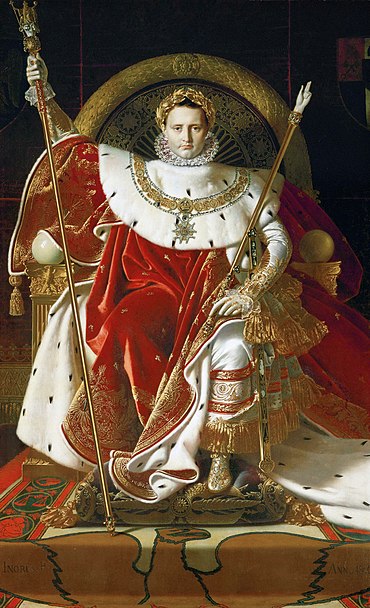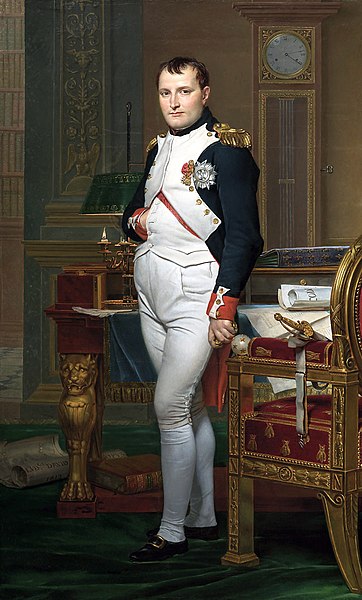Napoleon Bonaparte is one of the most popular and controversial conquerors in the world. His intriguing and colorful personal life and political life made him one of the most popular figures all over the world.
1.) Napoleon Bonaparte was born on August 15, 1769 in the island of Corsica and died in May 5, 1821 at the age of 51.
2.) Autopsy report concluded that Napoleon died of stomach cancer but some scientists believed he was poisoned with arsenic.
3.) Forensic samples of Napoleon’s hair did show high levels which is 13 times the normal amount of the element.
4.) Napoleon was one of the greatest military commanders in history. Oftentimes portrayed as a power hungry conqueror, this strong and ambitious man is indeed one of the greatest.
5.) Before going any further, maybe you would like to know one of the darkest secrets of Napoleon Bonaparte – this great man sufferedfrom hemorrhoids – a condition which is highly considered disgusting during his days.

6.) Napoleon’s legal reform, the Napoleonic Code, was influential on many civil laws jurisdictions worldwide.
7.) His military campaigns are studied extensively at military academies from all over the world.
8.) Napoleon’s father, Carlo Maria Buonaparte or Charles-Marie Bonaparte, was a Corsican politician and lawyer.
9.) Napoleon had 12 siblings, 7 of them survived until adulthood.
10.) His elder brother, Joseph-Napoleon Bonaparte was King of Naples and Sicily for two years from 1806 to 1808 and King of Spain and the Indies as Joseph I of Spain from 1808 to1813.
11.) Napoleon’s sister, Elisa Bonaparte – princess of Piombino and Lucca, then Grand Duchess of Tuscany, was his only sister to possess real political power.
12.) Lucien Bonaparte, Napoleon’s younger brother reigned as Prince of Canino from 1814 to 1840 and Prince of Musignano 1824 to 1840.
13.) His brother, Louis Bonaparte reigned as King of Holland for 4 years from 1806 to 1810. He was the father of Napoleon III, the last emperor of France.
14.) Napoleon III, who was born Louis-Napoleon Bonaparte was napoleon’s nephew and was the President of the French Second Republic and as Napoleon III, the ruler of the Second French Empire.
15.) Napoleon’s nephew by sister Elisa, Camerata-Passionei di Mazzoleni, one of the maitres des requetes au Conseil d’Etat, committed suicide at the age of 26 after being prevented from marrying an actress.

16.) Napoleon’s nephew by Lucien, Louis Lucien Bonaparte, served two brief terms in the Assembly as representative for Corsica in 1848 and for the Seine departments in 1849.
17.) Pauline Bonaparte, Napoleon’s sister who reigned as Duchess of Guastalla, was the only Bonaparte sibling to visit Napoleon on his principality at Elba.
18.) Prince Achille Murat or Achille Charles Louis Napoleon, Crown Prince of Naples, Hereditary Prince of Berg, 2nd Prince Murat was a nephew of Napoleon to her sister who became mayor of Tallahassee in the United States.
19.) Jerome Bonaparte, the youngest brother of Napoleon, reigned asFrench Prince, King of Westphalia and1st Prince of Monfort.
20.) Napoleon Joseph Charles Paul Bonaparte, Napoleon’s nephew by his brother Jerome was elected to the National Assembly as a representative of Corsica.
21.) Napoleon Joseph Charles Paul Bonaparte was buried at Les Invalides, Paris – the capital of France.
22.) Napoleon’s grandnephew to his brother Jerome Charles Joseph Bonaparte served as US State Secretary of the Navy and US Attorney General. Jerome Joseph Charles founded the precursor of the FBI or Federal Bureau Investigation in 1908.
23.) Charles Napoleon who was born in 1950 as Charles Marie Jerome Victor Napoleon Bonaparte or Charles, Prince Napoleon, is the great-great-grand-nephew of Napoleon, is a French politician. He considers himself as male heir to the rights and legacy established by Napoleon, his great-great-grand-uncle.
24.) Napoleon’s great-great-great-grand-nephew Jean Christophe, Prince Napoleon, titular 7th Prince of Montfort (Jean Christophe Louis Ferdinand Alberic Napoleon Bonaparte; 11 July 1986) is a claimant to headship of the House of Bonaparte.
25.) Napoleon’s father was a gambler and when he died of stomach cancer in 1785, left his surviving wife and eight children penniless.

26.) Napoleon’s mother Letizia, whose father was a Captain of Corse Regiments of Chivalry and Infantry in the Army of the Republic of Genoa, was not formally educated.
27.) Napoleon’s mother died in 1836 at the age of 85 in Rome just 3 weeks before the 50th anniversary of her husband’s death.
28.) Napoleon’s mother was nearly blind when she died and had outlived him by 15 years.
29.) Maria Letizia Ramolino, Napoleon’s mother, was only 14 when she married Carlo Buonaparte.
30.) Napoleon’s eldest brother was also named Napoleon. The former did not survive adulthood.
31.) Napoleon was a Roman Catholic but did not believe in the existence of a living God.
32.) Napoleon spoke with a marked Corsican accent and was teased by other students for this and he never learned to spell properly.
33.) Bonaparte was good in mathematics and was fairly well acquainted with history and geography.
34.) Napoleon took the pride and honor for being the first Corsican to graduate from the Ecole Militaire.
35.) His capture of the City of Toulon led to his promotion to Brigadier General at the age of 24 and was put in charge of the artillery of France's Army of Italy.

36.) Napoleon was engaged to Desiree in April 1795. She was presented to him by his brother Joseph.
37.) Her complete name is Bernardine Eugenie Desiree Clary a Frenchwoman who became Queen of Sweden and Norway as the consort of King Charles XIV John.
38.) Napoleon was also a writer; he wrote a romantic novella entitled Clisson et Eugenie. The story was about a soldier and his lover, in a clear parallel to his own relationship with Desiree.
39.) Napoleon Bonaparte marched to Venice and forced its surrender and ending its 1,100 years of independence. Napoleon also authorized the French to loot treasures such as the Horses of Saint Mark.
40.) On 15 September, Bonaparte was removed from the list of generals in regular service for his refusal to serve in the Vendee campaign. He then faced a difficult financial situation and reduced career prospects
41.) In Bonaparte’s Italian campaign, his army captured 150,000 prisoners, 540 cannons and 170 standards.
42.) The French army fought 67 actions and won 18 pitched battles through superior artillery technology and Bonaparte’s tactics.
43.) Napoleon’s Egyptian expedition of 1798 included a group of 167 scientists: chemists, geodesists, mathematicians and naturalists and their discoveries included the Rosetta Stones.
44.) The ‘attack of Jaffa’ on March 3-7, 1799 was brutal; Bonaparte, ordered the garrison and 1,400 prisoners were executed by bayonet or drowning to save bullets. Men, women and children were robbed and murdered for three days
45.) As the most powerful man in France, Napoleon used the title ‘First Consul’. This title lapsed when in December 1804 had himself crowned as emperor.
(Carlo Bounaparte)
46.) One of Napoleon’s greatest achievements was the establishment of the Banque de France or central bank.
47.) The story that Napoleon seized the crown out of the hands of Pope Pius VII during his coronation as emperor to avoid his subjugation to the authority of the pontiff is absolutely false.
48.) Napoleon sold to the United States their French possession – the so-called Louisiana Purchase for less than three cents per acre or $7.40 per km².
49.) Bonaparte was a military and political leader during the latter stages of the French Revolution.
50.) Napoleon Bonaparte’s first wife was Josephine de Beauharnais. She was the first Empress of the French.
51.) Josephine and Napoleon were married in 1796 but she did not bear Napoleon any children which resulted to a divorced in 1810.
52.) Before Josephine became the wife of Napoleon, she was the mistress of several leading political figures in France.
53.) Josephine was beautiful but his mouth is always shut so as not to reveal her halitosis or ‘bad breath’.
54.) Many of Napoleon’s letters to his wife Josephine are still intact today.
55.) When Napoleon left Josephine for a military campaign in 1796, Josephine started an affair with a handsome Hussar lieutenant named Hyppolyte Charles.

56.) Before Napoleon met her first wife, she had been known as “Rose”. He doesn’t like it and called her “Josephine”.
57.) Josephine was known to have many lovers and was reputedly well practiced in the arts of lovemaking.
58.) Having learned of his wife’s infidelity, during the Egyptian campaign of 1798, Napoleon Bonaparte started an affair of his own with Pauline Bellisle Foures, the wife of a junior officer who became known as "Napoleon's Cleopatra."
59.) Napoleon also had an affair with Elisabeth le Michaud d'Arcon de Vaudey, a very pretty woman and was the cause of a violent scene between the Emperor and his wife shortly before their coronation.
60.) In March 1810, Napoleon married Marie-Louise of Austria by proxy; the formal ceremony took place at the Louvre on April 1, 1810
61.) Marie-Louise was 18 years of age when she married Napoleon.
62.) Marie-Louise baptismal name was Maria Ludovica Leopoldina Francisca Theresa Josepha Lucia….whew… that’s quite long.
63.) Napoleon’s 2nd wife was a polyglot being fluent in many languages such as English, French, Italian, Latin and Spanish aside from her native German.
64.) After Napoleon and Marie-Louise wedding ceremony, 13 cardinals were imprisoned for non-attendance at the marriage ceremony.
65.) Napoleon also intended and tried to marry the Grand Duchess Anna of the House of Romanov, younger sister of Tsar Alexander I of Russia but his proposal was rejected.

66.) Napoleon abdicated his throne in April 1814 and was exiled to Elba, Marie Louise returned to Austria and never seen her husband again.
67.) As Napoleon I, he was Emperor of the French from May 18, 1804 to April 11, 1814 for a period of 9 years, 328 days.
68.) Napoleon Bonaparte was crowned emperor on December 2, 1804.
69.) He was Emperor of the French again on March 20, 1815 up to June 22, 1815 which lasted for 94 days only. And his full title was His Imperial Majesty Napoleon the First, By the Grace of God and the Constitutions of the Republic, Emperor of the French.
70.) As King of Italy, he reigned from March 17, 1805 to April 11, 1814. He was crowned king on May 26, 1805.
71.) Napoleon’s full title from 1804 to 1805 was His Imperial an
Read more: http://www.bukisa.com/articles/481959_100-interesting-and-controversial-facts-about-napoleon-bonaparte#ixzz2YaWowZgY
Follow us: @bukisa on Twitter | bukisa on Facebook
No comments:
Post a Comment